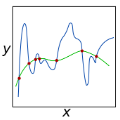It has been an important problem to design a proper discriminator for conditional generative adversarial networks (cGANs). In this paper, we investigate two popular choices, the projection-based and classification-based discriminators, and reveal that both of them suffer some kind of drawbacks that affect the learning ability of cGANs. Then, we present our solution that trains a powerful discriminator and avoids over-fitting with regularization. In addition, we unify multiple targets (class, domain, reality, etc.) into one loss function to enable a wider range of applications. Our algorithm, named \textbf{Omni-GAN}, achieves competitive performance on a few popular benchmarks. More importantly, Omni-GAN enjoys both high generation quality and low risks in mode collapse, offering new possibilities for optimizing cGANs.Code is available at \url{https://github.com/PeterouZh/Omni-GAN-PyTorch}.
翻译:设计有条件的基因对抗网络(cGANs)的适当歧视者是一个重要问题。 在本文中,我们调查了两种流行的选择,即基于预测的和基于分类的歧视者,并揭示了这两种选择都存在某种缺陷,影响到cGANs的学习能力。然后,我们提出了培养强大的歧视者并避免过度适应正规化的解决方案。此外,我们将多重目标(阶级、领域、现实等)合并为一种损失功能,以便能够进行更广泛的应用。我们的算法,名为\ textbf{Omni-GAN},在几个受欢迎的基准上取得了竞争性业绩。更重要的是,Omni-GAN拥有高代质量和低模式崩溃风险,为优化cGANs提供了新的可能性。Code可在以下https://github.com/PeterouZh/Omni-GAN-PyTorch}查阅。




